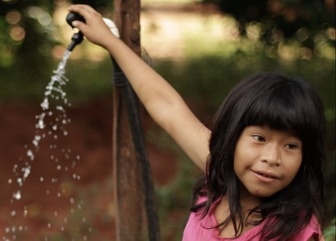
The Guardian newspaper has a very interesting about how Paraguay became the only country to achieve the Millennium Development Goal water goal for rural populations.
The MDG target was to halve the proportion of the population without sustainable access to safe drinking water and basic sanitation by 2015. Paraguay not only achieved it but exceeded it, with more than 94% of its rural population now having access to safe water, compared with 51.6% in 2000, more than any other country.
One of the main reasons Paraguay succeeded where so many have failed is because its politicians asked the right questions from the start and they took a long-term view. According to the article, 'from the beginning, the key to Paraguay’s approach was the focus on sustainability'. The World Bank's Maria Angelica] Sotomayor said: “They gave it a lot of attention, thinking about how you can construct a system but who will operate it and how will you manage it? Who is responsible in a rural area if a hand pump breaks? They were asking the right questions.”
Paraguay also placed its sanitation and water agency within the Department of Health, helping ensure the issue as a public health matter. In 2007, Paraguay also recognised in law access to sufficient and quality water as a human right, three years before the right to water and sanitation was recognised by the UN
The MDG target was to halve the proportion of the population without sustainable access to safe drinking water and basic sanitation by 2015. Paraguay not only achieved it but exceeded it, with more than 94% of its rural population now having access to safe water, compared with 51.6% in 2000, more than any other country.
One of the main reasons Paraguay succeeded where so many have failed is because its politicians asked the right questions from the start and they took a long-term view. According to the article, 'from the beginning, the key to Paraguay’s approach was the focus on sustainability'. The World Bank's Maria Angelica] Sotomayor said: “They gave it a lot of attention, thinking about how you can construct a system but who will operate it and how will you manage it? Who is responsible in a rural area if a hand pump breaks? They were asking the right questions.”
Paraguay also placed its sanitation and water agency within the Department of Health, helping ensure the issue as a public health matter. In 2007, Paraguay also recognised in law access to sufficient and quality water as a human right, three years before the right to water and sanitation was recognised by the UN
 RSS Feed
RSS Feed
